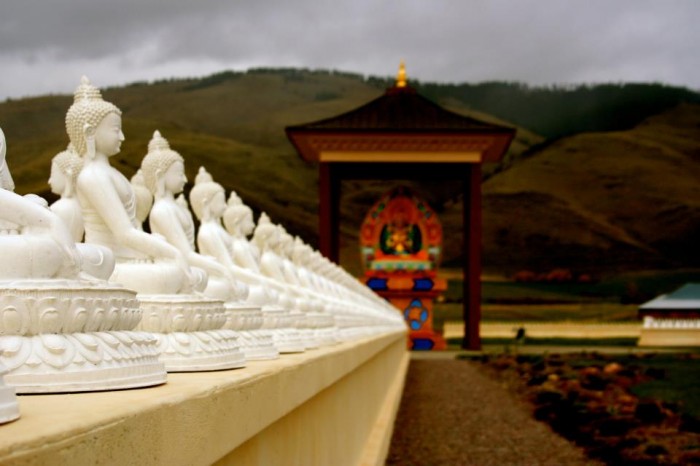About five years ago, I got a massage in Taos New Mexico, while on retreat there studying with one of my teachers, Natalie Goldberg.
The masseuse set me up on her table, adjusted the blankets, and then held my feet for a few moments.
“You are exquisitely sensitive,” she said. I hadn’t flinched, which I sometimes do when people unexpectedly touch my feet. My internal response was simultaneous:
How did she know? And…Duh.
Until I began practicing Buddhism, and even for many years into my meditation practice, I took being called sensitive to be an insult, or a statement of weakness. Like so many other things, I have now changed my view on vulnerability, not knowing the answer, and gentleness. I now see sensitivity as an attribute, with both positive and negative aspects.
It is true that sensitivity can be problematic. I get overwhelmed by sound and light in the grocery store, and want to run out half way through my shopping, even on a good day. But it is not inherently a problem. Like any attribute, it has what Buddhism calls its neurotic aspects and wisdom aspects. I think the wisest manifestation of sensitivity is awareness, the twin word to mindfulness we hear so often nowadays.
How do we transform it? By changing our reactions. By applying mindfulness—knowing what is happening in detail—we can become aware when our sensitivity is pulling us down, and utilize the following five practices to transform what seems to be problematic (being sensitive) into a major asset (being aware).
- Let your sensitivity open to space. One of the things that feels like a natural tendency to me when I become over-stimulated is to shut down. I want no more stimulation. But if I can relax into the bigger space – the hugeness of the grocery store, the open sky above me if I am outside, the space between people, even the gaps in my mind, as tiny as they might be, between freak-outs, can help soften the whole situation. That same sensitivity is without bias, and can help me pick up on things to help me in the situation.
- Remember all beings suffer. This is not about forgetting your own suffering. Instead, it is about using your moments of sharp sensitivity to become aware, reminded that all beings struggle. On a crowded plane, delayed for take off, feeling the agitation of everyone around me, I start to get freaked out, too. If I can connect to even one other person, see their fear, actually feel their energy and feel compassion for them, “That must be hard! He wants to get home to see his daughter who is sick.” It helps soften me to people I otherwise want to shut out because I feel they are giving off bad vibes. Tonglen and Maitri/Metta are great formal versions of this, but you can do it informally, too.
- Come to your senses. If I am in a concert and it is too loud and I cannot leave, I tune into my other senses: sight, taste, air on my skin…literally coming to all my senses helps to keep me from feeling overloaded. It seems anti-intuitive, but if all of them feel overloaded, literally connecting to my senses one-by-one helps me stay clear about what it is I am actually sensing, and my internal reactions. Tibetan Buddhism talks about the five traditional senses, and also the sixth sense: sensing what the mind/heart is doing. So bring this into awareness as well, less on the level of content, and more on the level of felt quality (speedy mind, racing heart) without judgment when possible.
Note: Usually reality is far less freaky than what we have made of it. So while I may be telling myself it is too much, in fact, when I tune in to what is actually happening, it turns out the too much is mostly my mind’s activity. Still real, but not external. Helpful to know.
- Leave the situation without shutting down. Choosing to leave a situation if there is really no remedy in any of the above choices is best. However, don’t leave it just in order to shut down more. One of the worst things I can do for myself is to feel like any stimulation—touch from my wife, soothing music, a bath—will push me over the top. Coming back to my senses for something soothing and pleasurable is important healing, to remember that it is not my senses fault, and to remember that being sensitive has its positive sides.
- Practice your awareness when it is not challenged. Of course, as a Buddhist, I am going to recommend meditation to help strengthen both your mindfulness and awareness. Mindfulness—tracking what is in our minds and situation—and awareness—a more panoramic accepting and holding of what is happening—are both key to making any of those first four practices work. Meditation reminds us that our thoughts are a large part of our experience of any situation. Often, when it seems our senses are overwhelmed, really it’s our mind’s reactions to sensory overload. None of these reactions/thoughts/feelings are permanent or solid. Our senses aren’t either. This me that feels threatened when overloaded doesn’t exist. Meditation helps us to cultivate humor, compassion and a deep connection with any given moment, which we can then let go of when it moves on naturally.
These suggestions are all given with kindness, and not to replace other kinds of self-care needed. Over time, I have accepted that I am more introverted than I once thought, and easily over-stimulated. But learning this with love helps me to keep from pushing myself into bad situations to begin with.
While I give examples of how to deal with direct sensory over-stimulation, any of these can work for feeling overwhelmed in general in life. I often find that overwhelm comes on the tails of actually feeling numb. It seems opposite of what you would think, but shutting down does, in fact, make it worse. Even if I have to turn off the CNN war report, or un-subscribe from the constant tirade email newsletters, I am still remembering to stay in contact with our world. I make better choices about how to approach conflict and real suffering, so it remains workable instead of shutting me down.
May these practices be of benefit to all. After all, we are all sentient beings.
Love elephant and want to go steady?
Sign up for our (curated) daily and weekly newsletters!
Editor: Jenna Penielle Lyons
Photo: Courtesy of the editor







Read 0 comments and reply